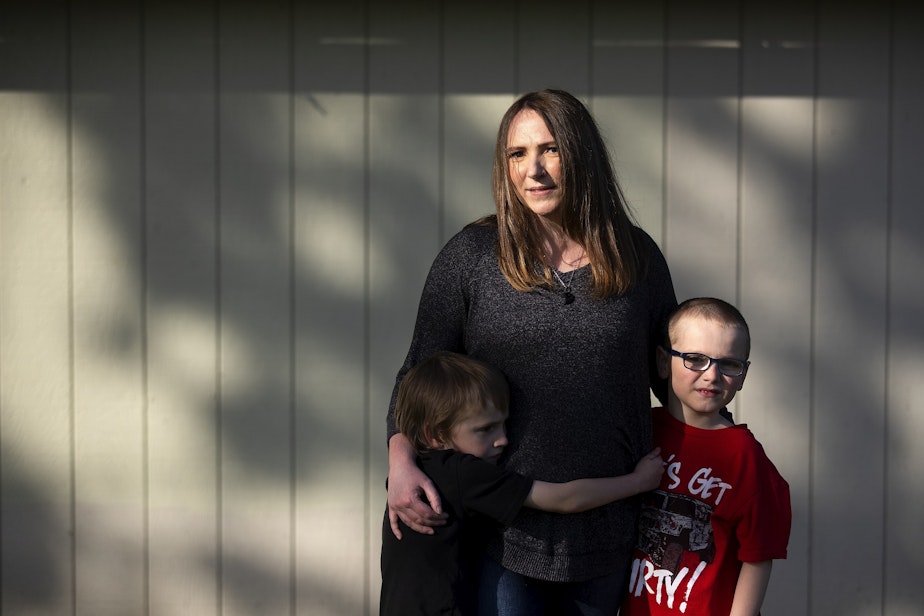Many things got Amanda Schroeder into addiction. Her kids got her out

Last February, Amanda Schroeder landed in jail for breaking into a car to keep warm.
"I called my son, and my son's like, 'You're in jail again, Mom?'" she said. "The fact that my 6-year-old is being like, 'Again?' — that, like, really hit hard."
It was a turning point for her – and she was ready when a caseworker reached out. The worker was with Rediscovery, a program that meets people living with addiction wherever they are, and tries to help them.
Schroeder’s life had been spiraling for years. Her path into addiction was similar to many others on the Olympic Peninsula, which has the highest rate of overdose deaths in the state. The root causes involve trauma, poverty, and adverse childhood experiences.
Schroeder’s upbringing included all of the above. She said her mother used drugs; she said her dad was an alcoholic. As a child, she was physically and sexually abused. To cope, she started using drugs when she was 11 years old.
By 2018, Schroeder was in her late 20s, addicted to meth and heroin.
Sponsored
The first time the Rediscovery outreach worker checked in with Schroeder was in late 2019. The worker asked Schroeder if she needed anything: bus tickets? Socks? Snacks? And she offered her time if Schroeder wanted to talk.

Over the next couple of years, Rediscovery outreach workers checked in with Schroeder every week or so, if they could find her.
They met with her the times she went to jail for illegally entering a house or vehicle, which she said she did because she was cold.
And once, they drove her to an in-patient treatment program in Spokane, but she didn’t stay. She wasn’t ready.
Sponsored
RELATED: Opioids on the Olympic Peninsula
Numbing the pain: Opioids on the Olympic Peninsula
Sponsored
In early 2022, things got even worse.
“I wasn’t eating; I wasn’t sleeping,” Schroeder said. She said she weighed 91 pounds. That’s also when she landed in jail for breaking into a car.
But that painful call with her 6-year-old son gave her the resolve to turn things around. When Rediscovery reached out, she was ready.
Sponsored
Paine rode along with Miller as he drove slowly down a bike path, with a scenic shoreline on one side and a steep cliff on the other.
Paine suddenly told him to stop, as she pointed up the hillside.
Partway up was a blue tent, leaning against a tree to keep it from sliding down. Miller and Paine climbed up to it.
Miller announced himself: “Port Angeles Police Department, code enforcement!”
Paine started by offering the concrete necessities she carries in her backpack: dry socks, bus tickets, snacks.
Sponsored
“Do you want a peanut butter?” she asked the person in the tent near the bike path. When the person in the tent near the said he didn’t, she prodded, “Peanut butter’s good for you — it’s good protein!”
Officer Miller started with immediate concerns, too. "We’ve got to get you into shelter,” he said. “You can’t stay here. It’s actually illegal to camp here.”
Paine said she knew this man from previous encounters. He was in his thirties. And he had been in treatment, but then his mom died, and he went back to using fentanyl.
“Honey, you need to get signed up for some counseling maybe, too,” she told him.
“Here's the thing with fentanyl, man,” Officer Miller added. “I'm giving it to you straight. They're cutting it with something now that’s gonna kill you. It’s a vet tranquilizer.”
Sponsored
Outreach workers, people who work in recovery, and the public health officer out on the Olympic Peninsula are all worried about Xylazine, known on the streets as “tranq.” It’s dangerous because, if someone overdoses on fentanyl mixed with Xylazine, naloxone won’t necessarily save them.
“You're out here kind of by yourself,” Miller went on. “If something bad happens, there's no one here to give you first aid. You got to put yourself around some people.”
Together, the three of them made a plan: The person in the tent was going to pack up his stuff and go to the clinic where Paine works. From there, she’d give him a ride to Port Angeles’ only homeless shelter.
“If you grew up in Port Angeles, you know someone who’s addicted to drugs,” said Dr. Allison Berry, the public health officer for Clallam and Jefferson counties. Dr. Berry also works one day a week at a treatment center.
Berry said programs like Rediscovery are great, but the scale of the area’s opioid epidemic is enormous. She said traumatic childhood experiences like Amanda Schroeder’s are part of the reason for that.
“People are really self-treating trauma, treating anxiety and depression,” she said. “Communities that have higher rates of poverty, higher rates of adverse childhood experiences, are all more prone to addiction.”
“The communities that got hit the hardest by the opiate crisis have mostly been rural, working-class communities much like ours, where people did hard-working jobs that expose them to injury,” she added.
“We also have a lot of poverty out here; we have a lot of social vulnerability. All those things, I think, came together in a perfect storm.”
In the mid-2010s, the health department and others on the peninsula launched a three-pronged approach to tackling the crisis, Berry said: Prescription reform, to reduce new opioid addictions; access to naloxone, to reduce overdose deaths; and access to treatment.
That was starting to work, Berry said, when, in early 2021, fentanyl showed up.
“Fentanyl is something you have to take numerous times throughout the day to get rid of withdrawals,” Berry said. “Most of our clients were using heroin, say, four times a day. But when it comes to fentanyl, they're using 10, 15 times a day, this incredibly strong drug that wears off quickly.”
Berry said her patients don’t even want fentanyl, but they can’t find heroin anymore.
The shift from heroin to a considerably stronger and more dangerous drug undid much of the work communities had been doing.
“It takes far less to lead to an overdose,” she said. “We saw a big spike in overdoses related to that."
What the peninsula needs now, Berry said, is more in-patient treatment capacity — they only have a handful of beds — and access to outpatient treatment after hours and on the weekends.
“When someone’s finally ready, you have about a 24-hour window to get them into care before usually the withdrawals will take over and they’ll go right back,” she explained. “And they’re at high risk of dying during that time.”
Beyond treatment, Berry said, people also need housing and mental health care, and there’s not enough of either.
But what she really wants to see is more work preventing addiction in the first place. She said the kids on the peninsula who’ve suffered from trauma need programs to support them, so they don’t turn to substances later on.
“If we had all of that, I think we could beat this thing,” she said. “But that’s going to take a lot of focused investment in this community.”
“People can be helped. You never know when there’ll be a success story,” said Brian Smith, the Port Angeles police chief.
Chief Smith was instrumental in starting the program to have outreach workers ride along with police officers. His goal was to get ahead of problems: to help people before they broke the law, or to help them so they wouldn’t break the law again.
“We’re seeing the same people over and over again, and the officers know almost all the people they’re dealing with,” Smith said.
Smith said getting ahead of that involves getting people into treatment, persuading them to accept services.
“It’s an approach that puts the person first, focuses on the person that we’re trying to help,” Smith said.
Smith still sees a place for arrests and jail time, when people don’t accept services voluntarily.
“People will tell you when they’re in jail was the only time they thought about not using because they can’t use in jail,” he said. “And we have the opportunity for social workers and case managers to get access to people and to reach them.”
It’s controversial: Health and policy experts say criminalizing drug use is not an effective way to move people toward treatment, and that when people leave jail, that’s one of the most dangerous times, when they’re more likely to overdose and die.

Riding along with police is just one of many ways the Rediscovery program tries to reach people.
They go to jail and offer people medications for opioid use disorder there, they hold a clinic at the Port Angeles shelter, and they do outreach on their own.
Pam Paine, the outreach worker who rides along with Officer Derek Miller, said it’s emotionally taxing work.
“We've lost a lot of participants in this last year — a LOT — and it makes it really hard,” she said.
“You get close to these people, and then they have an overdose, and they're gone, and you're never gonna see ’em again, and it sucks,” said Paine’s colleague Kendall McComb. “But that's why we do what we do. Because any person that we can get out of this life and into recovery is another one that we've saved.”
After her arrest for breaking into a car, Amanda Schroeder — the mom who suffered from opioid use disorder for years — spent two months in jail, going through withdrawal.
“When I stepped out those doors, I made sure that instead of doing exactly how I would always do, going right back to it, I made sure that Kelly was there to pick me up,” Schroeder said.
Kelly is the outreach worker with Rediscovery who’d been trying to connect with Schroeder for years.
She picked Schroeder up from jail and helped her deal with logistics, like getting a phone and dealing with an outstanding warrant. And Kelly helped Schroeder set up an interview at a sober living house — a safe place to live, where she wouldn’t be tempted to relapse.
“I loved it there,” Schroeder said, noting how she became friends with some of the other residents. “I was kind of that girl who didn’t really, like, have a lot of girlfriends, so that helped… when I didn’t have a strong connection like that.”
Schroeder started to process the trauma that had led her into addiction in the first place, and she went back to school and is nearly finished with her GED.
And she has her kids back.
She’s renting the top floor of her stepmom’s house and living with her two sons there. They’re 7 and 8 years old, in first and second grades.
Schroeder’s older son is struggling with reading, so the two of them practice together every day after school, sitting side by side at the dining room table, going through his homework folder.
Schroeder said she remembers the moment with him when she realized things were turning around.
“One time he came up to me and he was like, ‘I love you, Mom,’ and then he hugged me,” she said.
“It kind of made me realize, even though I wasn’t there, and things weren’t always good, he still loves me and he is forgiving for time missed.”




